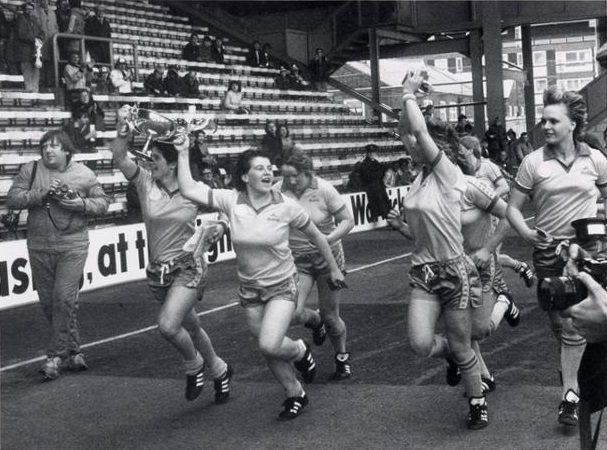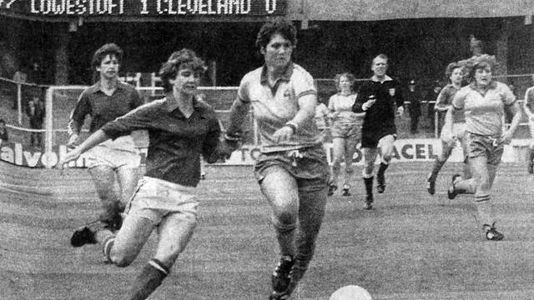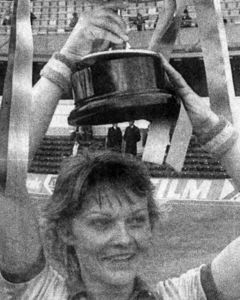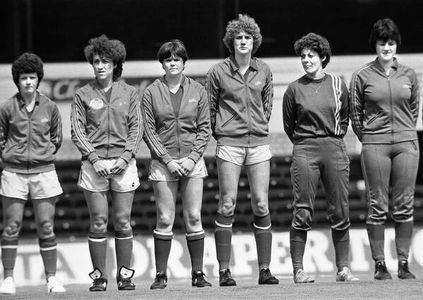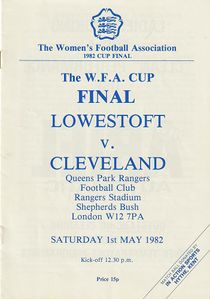1982 WFA Cup Final (lost footage of football match; 1982): Difference between revisions
(Truly, the greatest sporting day in the history of the most easterly town in Britain! Very proud of the Lowestoft team indeed. Some brief highlights apparently were on World of Sport, but they alongside the full tape haven't resurfaced.) |
No edit summary |
||
| (One intermediate revision by the same user not shown) | |||
| Line 5: | Line 5: | ||
|status=<span style="color:red;">'''Lost'''</span> | |status=<span style="color:red;">'''Lost'''</span> | ||
}} | }} | ||
The '''''1982 WFA Cup Final''''' culminated the | The '''''1982 WFA Cup Final''''' culminated the 1981-82 WFA Cup season. Occurring on 1st May 1982 at Loftus Road, it featured Lowestoft defeating Cleveland Spartans 2-0 to claim its sole WFA Cup. | ||
==Background== | ==Background== | ||
| Line 15: | Line 15: | ||
==The Match== | ==The Match== | ||
The Final itself occurred on | The Final itself occurred on 1st May.<ref name="result"/> Initially, while the game proved lively, both clubs were struggling with Loftus Road's "Omniturf". However, the artificial pitch proved more of an issue for Cleveland, as they lacked the AstroTurf boots Lowestoft wore.<ref name="history"/><ref name="archive"/> After eight minutes however, Cleveland nearly took the lead thanks to a header from Denise Markham that narrowly missed the goal.<ref name="history"/><ref name="archive"/> At the 26-minute mark, Cleveland goalkeeper Janice Elliott accidently passed the ball back to Lowestoft's Curl, who quickly fired a shot to make it 1-0.<ref name="history"/><ref name="archive"/> Following a match-long midfield battle, with Cleveland's Anna Citro and Lowestoft Vicky Johnson engaging in a duel throughout, Lowestoft would double their lead after 58 minutes when Curl took a corner that found Angela Poppy.<ref name="history"/><ref name="archive"/> Poppy capitalised on the opportunity to make it 2-0.<ref name="history"/><ref name="archive"/> | ||
Although Lowestoft suffered when Shirley Jones suffered a broken collarbone and was taken off after 69 minutes, the Waves generally controlled the remainder of the game to claim their first WFA Cup.<ref name="history"/><ref name="archive"/> A ''WFA News'' report stated that while the match "perhaps failed to reach the capable heights of a classic cup final", it "in fact won the heats of many new sporting friends in the world of professionalism."<ref name="archive"/> Lowestoft's Jackie Slack recalled in an interview with ''A History of the Women's FA Cup Final'' that "Winning the WFA Cup was what every player dreamed of. I was so proud to lift the Cup for the team especially as I had my family in the crowd that day."<ref name="history"/> This proved to be Lowestoft's swansong as well; aside from losing to Warminster in the Fourth Round 7-0 in the following WFA Cup, the club was forced to fold due to cancellation of the South East League, with no other sides being willing to travel long distances to play them.<ref name="history"/><ref name="archive"/> | Although Lowestoft suffered when Shirley Jones suffered a broken collarbone and was taken off after 69 minutes, the Waves generally controlled the remainder of the game to claim their first WFA Cup.<ref name="history"/><ref name="archive"/> A ''WFA News'' report stated that while the match "perhaps failed to reach the capable heights of a classic cup final", it "in fact won the heats of many new sporting friends in the world of professionalism."<ref name="archive"/> Lowestoft's Jackie Slack recalled in an interview with ''A History of the Women's FA Cup Final'' that "Winning the WFA Cup was what every player dreamed of. I was so proud to lift the Cup for the team especially as I had my family in the crowd that day."<ref name="history"/> This proved to be Lowestoft's swansong as well; aside from losing to Warminster in the Fourth Round 7-0 in the following WFA Cup, the club was forced to fold due to cancellation of the South East League, with no other sides being willing to travel long distances to play them.<ref name="history"/><ref name="archive"/> | ||
| Line 83: | Line 83: | ||
{{reflist}} | {{reflist}} | ||
[[Category:Lost recordings of | [[Category:Lost recordings of sports events]] | ||
[[Category:Completely lost media]] | [[Category:Completely lost media]] | ||
Latest revision as of 21:42, 24 January 2023
The 1982 WFA Cup Final culminated the 1981-82 WFA Cup season. Occurring on 1st May 1982 at Loftus Road, it featured Lowestoft defeating Cleveland Spartans 2-0 to claim its sole WFA Cup.
Background
Lowestoft's campaign from the First Round onwards saw it defeat Colchester, Suffolk Bluebirds, Old Actonians, Preston North End, Doncaster Belles, and Maidstone Mote United.[1][2] Meanwhile, Cleveland Spartans received a bye in the First Round, before going on to defeat Kilnhurst, Fodens, Aylesbury, and BYC Argule.[1][2] In the Semi-Finals, they beat defending champions Southampton, which officially ended Southampton's golden era that began since the WFA Cup's inauguration in the 1970/71 season.[3][1][2] Lowestoft had previously made the 1979 Final where they lost to Southampton, while this was Cleveland's first Final.[4][2]
Heading into the Final, Lowestoft were deemed the favourites, the Waves having also won the 1981-82 South East Women's League.[3][2] One national newspaper even went so far as to dub them "the female Liverpool".[3] Nevertheless, Cleveland were optimistic about their chances after having upset Southampton.[3][2] Both sides lost one player each due to injury; Sue Anderson broke her leg five days before the Final, while Lowestoft midfielder Debbie Brampton was unable to recover from a knee injury in time.[3] She would be replaced by Linda Curl.[3]
The 1982 WFA Cup Final also broke new ground in English women's football. Unlike in previous editions, where the WFA made agreements to stage Finals at non-league grounds, this time they had succeeded in forging a deal with Second Division side Queens Park Rangers to host it at Loftus Road.[3][2] By moving the Final from a Sunday to a Saturday, it would enable the WFA the opportunity to attract new fans, as the Final would be held just hours before QPR's fixture with Bolton Wanderers.[3][2] This was not the first time a doubleheader like this occurred in English women's football. On 21st March 1981, Lowestoft faced Maidstone at Carrow Road prior to Norwich City vs Arsenal.[2] Approximately 500 were in attendance for the 1982 Final, with a further 500 arriving by the time the match ended.[5][6][3] The match would be sponsored by Trimtape as part of a one-match deal.[3][2]
The Match
The Final itself occurred on 1st May.[5] Initially, while the game proved lively, both clubs were struggling with Loftus Road's "Omniturf". However, the artificial pitch proved more of an issue for Cleveland, as they lacked the AstroTurf boots Lowestoft wore.[3][2] After eight minutes however, Cleveland nearly took the lead thanks to a header from Denise Markham that narrowly missed the goal.[3][2] At the 26-minute mark, Cleveland goalkeeper Janice Elliott accidently passed the ball back to Lowestoft's Curl, who quickly fired a shot to make it 1-0.[3][2] Following a match-long midfield battle, with Cleveland's Anna Citro and Lowestoft Vicky Johnson engaging in a duel throughout, Lowestoft would double their lead after 58 minutes when Curl took a corner that found Angela Poppy.[3][2] Poppy capitalised on the opportunity to make it 2-0.[3][2]
Although Lowestoft suffered when Shirley Jones suffered a broken collarbone and was taken off after 69 minutes, the Waves generally controlled the remainder of the game to claim their first WFA Cup.[3][2] A WFA News report stated that while the match "perhaps failed to reach the capable heights of a classic cup final", it "in fact won the heats of many new sporting friends in the world of professionalism."[2] Lowestoft's Jackie Slack recalled in an interview with A History of the Women's FA Cup Final that "Winning the WFA Cup was what every player dreamed of. I was so proud to lift the Cup for the team especially as I had my family in the crowd that day."[3] This proved to be Lowestoft's swansong as well; aside from losing to Warminster in the Fourth Round 7-0 in the following WFA Cup, the club was forced to fold due to cancellation of the South East League, with no other sides being willing to travel long distances to play them.[3][2]
Availability
According to A History of the Women's FA Cup Final author Chris Slegg, match highlights were broadcast as part of World of Sport.[7] Said highlights have yet to publicly resurface however, with many of World of Sports' episodes no longer existing within known archives.[8] The uncut tape of the match is also missing. Nevertheless, photos can be found online and in A History of the Women's FA Cup Final.[3][2][6]
Gallery
Images
See Also
Football Media
- 1937 FA Cup Final (partially found footage of football match; 1937)
- 1938 FA Cup Final (partially found footage of football match; 1938)
- 1939 FA Cup Final (partially found footage of football match; 1939)
- 1947 FA Cup Final (partially found footage of football match; 1947)
- 1948 FA Cup Final (partially found footage of football match; 1948)
- 1948 Summer Olympics (partially found television coverage of London Games; 1948)
- 1949 FA Cup Final (partially found footage of football match; 1949)
- 1950 FA Cup Final (partially found footage of football match; 1950)
- 1951 FA Cup Final (partially found footage of football match; 1951)
- 1955 Scottish Cup Final (partially found footage of football match; 1955)
- 1966 FIFA World Cup Final (partially found original colour film of international football match; 1966)
- 1971 WFA Cup Final (partially found footage of football match; 1971)
- 1973 WFA Cup Final (lost footage of football match; 1973)
- 1974 WFA Cup Final (lost footage of football match; 1974)
- 1976 WFA Cup Final (partially found footage of football match; 1976)
- 1977 WFA Cup Final (lost footage of football match; 1977)
- 1978 WFA Cup Final (lost footage of football match; 1978)
- 1979 WFA Cup Final (lost footage of football match; 1979)
- 1985-1986 WFA Cup (lost list of entries for football tournament; 1985)
- Arsenal 1-1 Sheffield United (lost radio commentary of football match; 1927)
- Arsenal 7-1 Hibernian (lost footage of charity football match; 1952)
- Arsenal vs Arsenal Reserves (lost footage of early BBC televised football match; 1937)
- Atlético Madrid 1-1 Real Madrid (lost footage of El Derbi Madrileño La Liga football match; 1958)
- Barbados 4–2 Grenada (partially found soccer match footage; 1994)
- Barnet 3-2 Wealdstone (lost footage of Athenian League football match; 1946)
- Brian Clough's Football Fortunes (lost DOS port of football management game; 1987)
- Charlton Athletic 1-0 Blackburn Rovers (lost footage of FA Cup match; 1947)
- England 0-1 Scotland (partially found footage of international football match; 1938)
- England 1-0 Scotland (lost footage of Schools' International football match; 1952)
- England 1-1 Scotland (partially found footage of international football match; 1947)
- England 1-3 Scotland (partially found footage of international football match; 1949)
- England 2-0 Italy (partially found footage of international football match; 1949)
- England 3-0 France (partially found footage of international football match; 1947)
- England 3-0 Rest of Europe (partially found footage of international football match; 1938)
- England 6-0 Switzerland (partially found footage of international football match; 1948)
- Falkirk 3-2 Newcastle United (lost footage of football match; 1953)
- FIFA Soccer 2002 (lost build of cancelled Game Boy Advance port of football game; existence unconfirmed; 2001-2002)
- Hallo! Bundesliga (lost GolTV series; mid 2000s-mid 2010s)
- Juventus 1-7 A.C. Milan (partially found footage of Serie A football match; 1950)
- Real Madrid 1-0 Barcelona (partially found footage of El Clásico La Liga football match; 1959)
- Real Madrid 3-0 Racing Santander (lost footage of La Liga football match; 1954)
- Scottish Universities 1-1 English Universities (lost footage of international football match; 1952)
- Serbia vs Albania (found footage of abandoned UEFA Euro 2016 qualifying match; 2014)
- United! (lost British soap opera; 1965-1967)
- Walthamstow Avenue 0-2 Queen's Park (lost footage of friendly football match; 1951)
References
- ↑ 1.0 1.1 1.2 Women's FA Cup detailing the road to the Final. Retrieved 30th Jul '22
- ↑ 2.00 2.01 2.02 2.03 2.04 2.05 2.06 2.07 2.08 2.09 2.10 2.11 2.12 2.13 2.14 2.15 2.16 2.17 2.18 Women's Football Archive detailing the two sides' history, their roads to the Final, the match itself, and the aftermath. Retrieved 30th Jul '22
- ↑ 3.00 3.01 3.02 3.03 3.04 3.05 3.06 3.07 3.08 3.09 3.10 3.11 3.12 3.13 3.14 3.15 3.16 3.17 3.18 A History of the Women's FA Cup Final detailing the 1982 WFA Cup Final match. Retrieved 30th Jul '22
- ↑ Women's FA Cup listing all the WFA Cup Finals. Retrieved 30th Jul '22
- ↑ 5.0 5.1 Women's FA Cup detailing the result and statistics of the match. Retrieved 30th Jul '22
- ↑ 6.0 6.1 The Lowestoft Journal recalling the match and providing some photos of it. Retrieved 30th Jul '22
- ↑ Private correspondence between Chris Slegg and Lost Media Wiki user SpaceManiac888. Retrieved 30th Jul '22
- ↑ TV Brain noting the extent of missing World of Sport episodes. Retrieved 30th Jul '22
